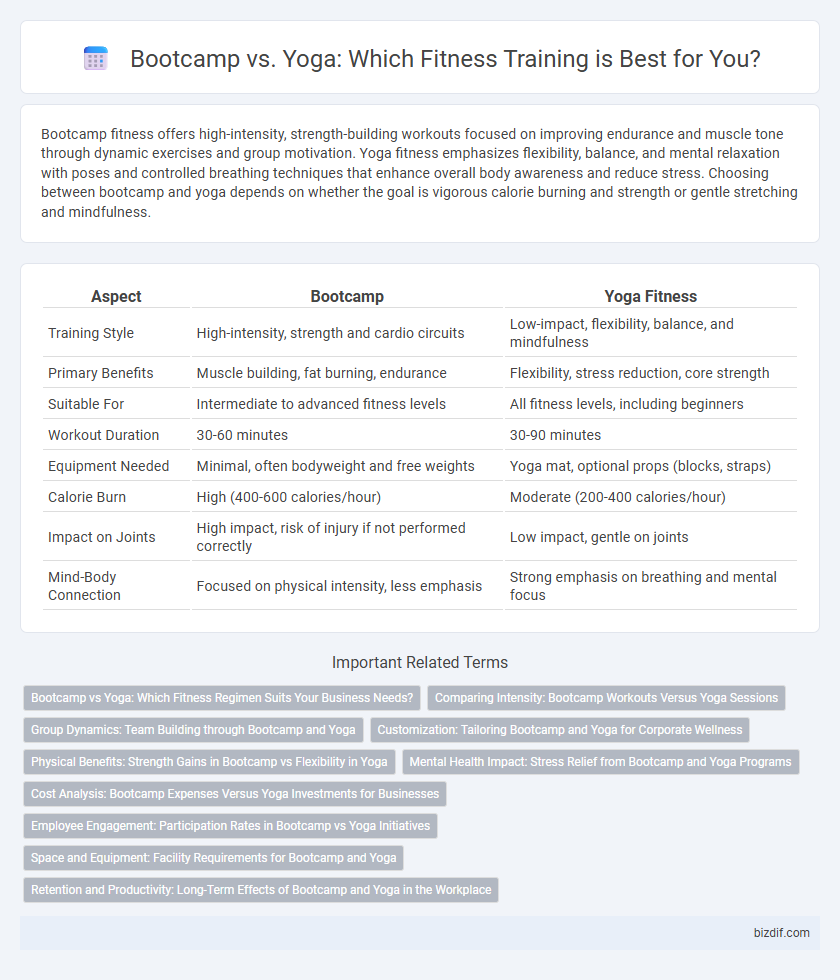Bootcamp fitness offers high-intensity, strength-building workouts focused on improving endurance and muscle tone through dynamic exercises and group motivation. Yoga fitness emphasizes flexibility, balance, and mental relaxation with poses and controlled breathing techniques that enhance overall body awareness and reduce stress. Choosing between bootcamp and yoga depends on whether the goal is vigorous calorie burning and strength or gentle stretching and mindfulness.
Table of Comparison
| Aspect | Bootcamp | Yoga Fitness |
|---|---|---|
| Training Style | High-intensity, strength and cardio circuits | Low-impact, flexibility, balance, and mindfulness |
| Primary Benefits | Muscle building, fat burning, endurance | Flexibility, stress reduction, core strength |
| Suitable For | Intermediate to advanced fitness levels | All fitness levels, including beginners |
| Workout Duration | 30-60 minutes | 30-90 minutes |
| Equipment Needed | Minimal, often bodyweight and free weights | Yoga mat, optional props (blocks, straps) |
| Calorie Burn | High (400-600 calories/hour) | Moderate (200-400 calories/hour) |
| Impact on Joints | High impact, risk of injury if not performed correctly | Low impact, gentle on joints |
| Mind-Body Connection | Focused on physical intensity, less emphasis | Strong emphasis on breathing and mental focus |
Bootcamp vs Yoga: Which Fitness Regimen Suits Your Business Needs?
Bootcamp training offers high-intensity, calorie-burning workouts that enhance strength and cardiovascular fitness, making it ideal for businesses aiming to attract clients seeking rapid results and group motivation. Yoga focuses on flexibility, mindfulness, and stress reduction, appealing to wellness-oriented customers who prioritize mental health and holistic fitness. Choosing between Bootcamp and Yoga depends on your target clientele's preferences and the specific health goals your business intends to support.
Comparing Intensity: Bootcamp Workouts Versus Yoga Sessions
Bootcamp workouts deliver high-intensity interval training that boosts cardiovascular endurance, muscular strength, and calorie burn through dynamic movements like sprints, burpees, and plyometrics. Yoga sessions emphasize controlled breathing, flexibility, and balance, offering low to moderate intensity focused on muscle recovery, core stability, and mental relaxation. Comparing intensity, bootcamp targets rapid calorie expenditure and physical exertion, while yoga prioritizes sustained muscle engagement and stress reduction over high-intensity conditioning.
Group Dynamics: Team Building through Bootcamp and Yoga
Bootcamp fitness fosters strong group dynamics through high-intensity team challenges that encourage camaraderie and mutual motivation. Yoga fitness emphasizes group harmony and collective mindfulness, enhancing emotional connection and stress relief within the community. Both approaches leverage group settings to build support networks and improve overall fitness outcomes.
Customization: Tailoring Bootcamp and Yoga for Corporate Wellness
Bootcamp and yoga fitness programs can be customized to enhance corporate wellness by addressing specific employee needs such as stress reduction, strength building, or flexibility improvement. Bootcamp sessions are often designed with adjustable intensity levels and varied exercises to accommodate different fitness abilities within the workplace. Yoga programs for corporate settings emphasize personalized sequences and mindfulness practices to promote mental clarity and physical well-being among employees.
Physical Benefits: Strength Gains in Bootcamp vs Flexibility in Yoga
Bootcamp fitness training emphasizes strength gains through high-intensity interval workouts, resistance exercises, and bodyweight movements that target muscle building and endurance. Yoga fitness prioritizes flexibility improvements by incorporating stretching, balance, and controlled breathing techniques that enhance joint mobility and overall muscle elasticity. Both approaches offer distinct physical benefits: bootcamp maximizes muscular strength and cardiovascular fitness, while yoga fosters enhanced flexibility and mental relaxation.
Mental Health Impact: Stress Relief from Bootcamp and Yoga Programs
Bootcamp fitness programs offer high-intensity workouts that promote the release of endorphins, effectively reducing stress and enhancing mental resilience. Yoga fitness emphasizes mindfulness and controlled breathing, which lowers cortisol levels and cultivates long-term emotional balance. Both methods provide distinct mental health benefits, with bootcamp targeting stress relief through physical exertion and yoga focusing on relaxation and mental clarity.
Cost Analysis: Bootcamp Expenses Versus Yoga Investments for Businesses
Bootcamp fitness programs generally require significant upfront investments in equipment, outdoor space, and certified trainers, leading to higher operational costs for businesses compared to yoga studios. Yoga fitness businesses often benefit from lower overhead expenses due to minimal equipment needs and the ability to operate in smaller, indoor spaces or even virtually. Analyzing these cost structures reveals that while bootcamps may attract higher price points per session, yoga businesses achieve greater scalability and profitability over time through reduced fixed costs.
Employee Engagement: Participation Rates in Bootcamp vs Yoga Initiatives
Bootcamp fitness programs typically see higher employee participation rates due to their dynamic and high-intensity nature, appealing to those seeking vigorous workouts. Yoga initiatives attract a consistent group focused on mindfulness and stress reduction, often drawing employees interested in flexibility and mental wellness. Companies implementing both programs report increased overall engagement by catering to diverse fitness preferences and promoting inclusive wellness cultures.
Space and Equipment: Facility Requirements for Bootcamp and Yoga
Bootcamp fitness classes demand spacious, open areas for dynamic movements and often require equipment like kettlebells, battle ropes, and agility ladders to support high-intensity training. Yoga sessions typically need minimal space, favoring quiet, calming environments with essentials such as yoga mats, blocks, and straps to facilitate flexibility and balance exercises. Facility requirements for bootcamp emphasize durability and versatility to accommodate vigorous workouts, whereas yoga spaces prioritize comfort and tranquility to enhance mindfulness and relaxation.
Retention and Productivity: Long-Term Effects of Bootcamp and Yoga in the Workplace
Bootcamp training enhances workplace productivity by improving cardiovascular endurance and strength, leading to increased energy levels and focus during work hours. Yoga promotes mental clarity and stress reduction, which supports employee retention by fostering a calm and balanced work environment. Both Bootcamp and Yoga contribute uniquely to long-term workplace wellness, boosting overall performance and job satisfaction.
Bootcamp vs Yoga Fitness Infographic

 bizdif.com
bizdif.com